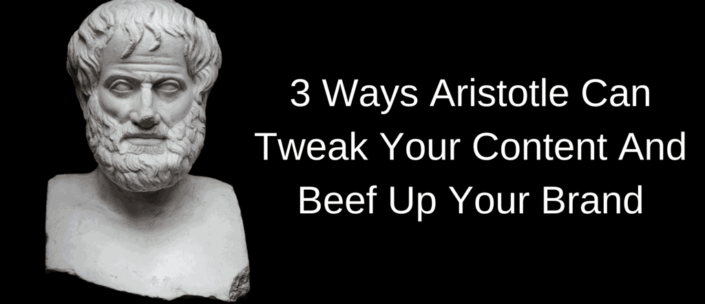Drama, olive oil, democracy – just a few of the things the ancient Greeks gave us. While they helped to lay the foundations of European civilization over 2,000 years ago, you probably think they haven’t got much to offer modern online marketing.
And you’d be wrong.
Ars Rhetorica
The Greeks were the first to seriously and methodically study the art of rhetoric – the art of persuasion. Although to modern ears the word ‘rhetoric’ often means just empty expressions and verbal trickery, in reality it is the careful study of the methods and means of persuading an audience through language.
In Greek democracy, decisions of policy at all levels required convincing the assembly of citizens that your idea was the best one. Just like in today’s world of online marketing, an ancient Greek needed to identify his audience, convey a message, and convince that audience that the message was given in their best interest. In other words, he needed to brand himself.
Aristotle On Persuasion
Aristotle was the first person ever to write on what we can think of as marketing strategy. He identified three ways that can be used to persuade an audience: ethos, logos, pathos. For our modern purposes, we can see these three elements as together working to establish brand.
Ethos
The term means ‘character.’ It refers to the persona that a speaker tries to create in the mind of his audience. This personality is not necessarily the true character of the speaker, but is instead the persona that best serves the particular message a speaker wants to convey.
For most of us, ethical considerations play a major part in our decision making process. An option coming from a person or source that we think is bad, corrupt, or deceitful we usually judge to be bad by association (even if it isn’t true).
As a result, we need to make sure always that the persona our brand adopts is positive. This persona needs to have a connection with the message it conveys. Cultivating the ethos of a good farmer when trying to sell cars is ridiculous. And while we need to tailor ethos to message, we must be careful to keep the number of messages and personae under control or risk appearing insincere.
Logos
This element refers to the message itself, and means the reason, or argument used to convince an audience.
The best means of making an audience receptive to your brand is to have a positive persona in place. The next step is to give clear reasons why your followers should act in the particular way you would like them to act.
For example, in bringing out a new product line, emphasize the problems that this product provides solutions for. Detailed information about the utility of products and services is critical to making the hoped-for purchasing act seem rational and in the consumer’s best interest. Clear, open, transparent sharing of content aimed at making your audiences’ lives better through your solution is a critical element of making that ethos bloom.
If there’s trust, purchasing will follow. A caveat, however: be careful of taking a hard sales approach. A pushy sales message damages ethos. Foster a conversation with your followers, induce in them a desire for the product that seems like common sense, and you’ll get more sales. Pushy sales tactics can create an ethos that is marked by avarice and the willingness to deceive in order to secure a sale.
Pathos
This term means ‘feeling’ or ’emotion.’ Arguably the most powerful of the three means of establishing brand awareness, it is also the hardest to control.
The trick is to focus on an emotional message that compliments the ethos you are adopting for a particular marketing drive. Talking about your company’s track record of supporting your local community is one way to induce positive feelings among followers. Having rock-solid customer service is another way to make consumers favorable to you.
Tone is an often overlooked way to promote good feelings in your audience. For instance, a humorous, light tone can work in some situations. By making your content a pleasure to read, you increase the value of your brand. In other situations, say in public safety, a serious, professional tone is required. By matching the tone to the matter at hand, you avoid upsetting your audience, and provide them with a pleasant, easy customer experience.
The Unity Of Persuasion
Breaking down your brand marketing according to ethos, logos, and pathos allows you to hone a clear, strong, and effective message to support your brand reception. Each component working well feeds into the others, so that a consistent marketing effort based on them is more efficient – and, perhaps more importantly, has an authentic ring. In today’s world of proliferating marketing messages, sincerity is a quality greatly to be desired.
A Classical Case Study: Themistocles of Athens
In 483 B.C., the Athenians discovered a rich vein of silver in their territory. Being a democracy, the spending of the revenue this would generate had to be decided on by the full assembly of citizens. One Athenian, Aristides, urged that the silver be distributed equally among the citizen body. Another Athenian statesman, Themistocles, realized that war was coming with Persia, the traditional enemy of the Greeks. He knew that the only hope Athens had of defeating the Persians would be in building and equipping a navy.
Themistocles had the task of convincing the Athenian citizenry to abandon an immediate good (getting cash money) and adopt a good not in their immediate self interest (giving the silver to the state to build a navy). By ignoring Persia as too remote and focusing instead on an enemy closer to home, Themistocles urged the creation of a navy to secure peace. The Athenians not only approved Themistocles’ motion, they banished Aristides.
By carefully understanding what his audience wanted (money), he persuaded them to abandon self interest and seek instead a remoter good, one they couldn’t own or spend directly. Themistocles was able to achieve this remarkable feat by branding himself as a patriot (his ethos). By emphasizing the glory of patriotism (a mixture of logos and pathos), he persuaded his fellow citizens to seek the glory of being patriots, too.







